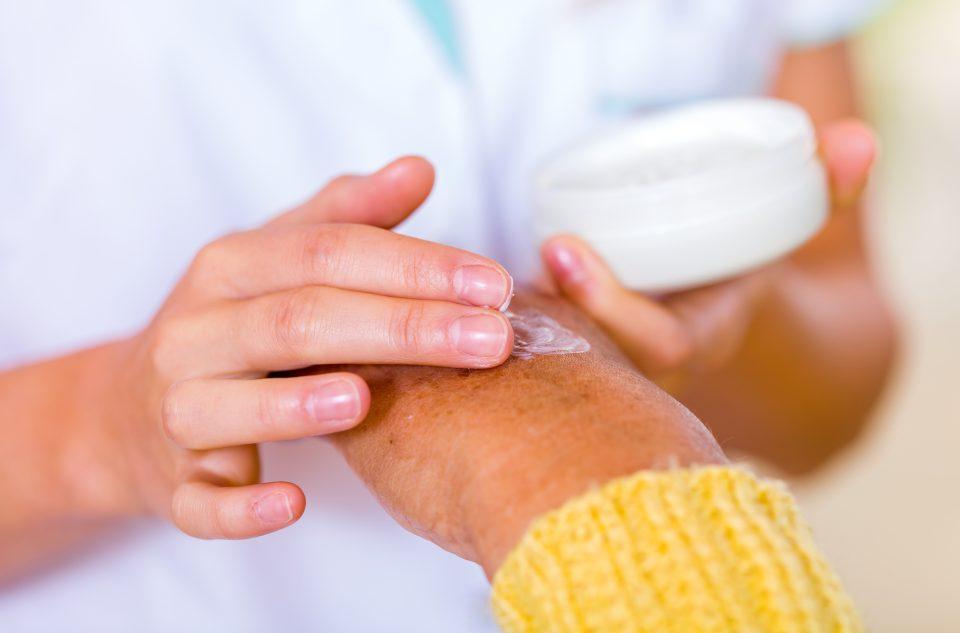

Hand Eczema; most commonly water, dry air, soap, detergent, chemicals, rubber gloves, personal care products after excessive contact with the skin due to irritation. Even baby products that appear to be harmless, even the frequent contact of the hands with water, may cause the disease to progress.
Who can have hand eczema? Who is more likely to be seen?
Although the disease can be seen all over the world, it is more common in individuals with atopic eczema who are predisposed to give a skin reaction.
In which occupational groups is hand eczema more common?
Some occupational groups are more susceptible to development of hand eczema, as they are more frequently exposed to irritants and allergens. One's hobbies are as important as his / her profession. These professional groups; Persons who are busy with cleaning, smearing, bakery workers, hairdressers, dental technicians, doctors, nurses, health workers, cement, brick and painters, painting, model, garden work. dealing with
What are the symptoms of hand eczema?
• Acute (onset) period; A large number of water-filled bubbles on a red and swollen surface and their rapid opening result in watering and scabs.
• Subacute period (following acute phase); A large number of dandruff and crusting is observed on a light red surface.
• In the chronic (advanced) period; When the skin is thickened and the dandruff is noticeable, crevices may develop. Depending on the cause of the disease, it can also be seen in different periods and itching may occur in every period.
How is eczema diagnosed?
Often, examination findings are sufficient. Mushroom examination and skin biopsy may be required to differentiate from other diseases. When allergic contact eczema is considered, patch testing can be performed in order to evaluate the responsible substances.
What are the triggering factors for hand eczema?
The substances we use and encounter in our daily life may be a cause or cause of the disease. Certain medications and sun rays can trigger disease, especially in eczema due to photosensitivity. In contact with oily products, contact with metallic liquids and coolant materials can cause irritation.
What are the principles of treatment in hand eczema?
The main reason for the treatment is to determine and avoid contact with this factor. It can sometimes be difficult to stay away from it completely. Whatever the cause, the trigger for a successful treatment in eczema should be avoided. Treatment may take a long time, especially in patients with long-term disease.
What are the recommendations to avoid triggering factors?
• Prolonged contact with water and soap causes loss of the natural protective layer of the skin. For this reason, it is more convenient to clean the hands with a odorless and colorless cleaner which is suitable for the skin of our skin instead of soap.
• It is more convenient to wash hands with warm water instead of hot or cold water.
• Moisturizers, especially in the form of long-lasting (chronic) form, can help to gain the moisture lost by the skin. Barrier creams and foams can physically prevent agents from entering the skin.
• Removal of the rings during work will prevent the irritants from accumulating under the rings.
• Ancillary support should be used for cleaning, dishwashing, child care or dishwashers and washing machines.
• Use of short-term prophylactic gloves is important. It should be kept in mind that the use of gloves for a long time may increase perspiration. It is appropriate to wear cotton gloves in gloves. Powdered gloves may exacerbate clinical findings and are therefore not suitable for use.
• Wearing short gloves during hair shampooing will reduce the negative effect of weak irritant substances on the skin.
• Hands should be contacted with detergent during applications such as toilet cleaning.
• Avoid direct contact with substances such as tomatoes, oranges and lemons.
• It is important to avoid and protect possible allergens during hair staining.
• If an occupational reason is considered, short-term occupational change, if there is a permanent problem, a change of profession with the suggestion of a physician may be brought to the agenda.
What are the treatment options?
Before starting the treatment, the doctor should be informed about pregnancy, breastfeeding, internal diseases, drugs used regularly for different reasons.
• Steroid creams applied to the skin are useful for the improvement of itching and redness and for the healing of eczema. If your skin is wet, you can use wet dressing with the medicines that your doctor recommends.
• If the disease is very severe, steroids other than the skin can be given through the mouth, vascular, and muscle applications.
• If there is no response to these therapies, other treatment options such as pimecrolimus, cyclosporine, methotrexate and phototherapy can be applied.